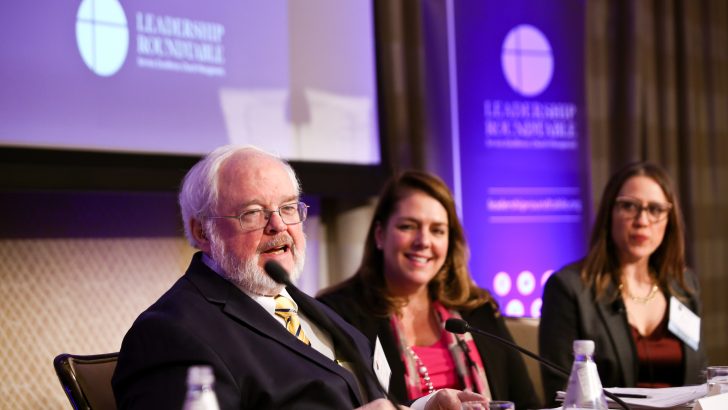Christopher White
A new report by one of the nation’s leading organisations promoting best practices in leadership within the Catholic Church chronicles the “twin crises” within the Catholic Church, that of sexual abuse and its cover-up.
The report, released on Friday by Leadership Roundtable, comes just days after Pope Francis’s historic meeting with the heads of bishops’ conferences around the world in which he pledged an all-out war on sexual abuse.
The 40-page report serves as a compilation of recommendations that emerged from the organisation’s Catholic Partnership Summit, which took place in February in the nation’s capital, and brought together a mix of clergy and lay Catholic leaders, and seeks to promote a way forward with a “preferential option for abuse victims and families”.
Leaders
Participants in the Catholic Partnership Summit included Cardinals Blase Cupich of Chicago, Sean O’Malley of Boston, Joseph Tobin of Newark; Fr Hans Zollner of the Center for Child Protection in Rome; Kathleen McChesney, a retired FBI agent who established the United States Conference of Catholic Bishops’ (USCCB) Office of Child Protection; John Carr, the USCCB’s former point man on Capitol Hill and current director of the Initiative on Catholic Social Thought and Public Life at Georgetown University; and a range of academics, theologians, and leaders from 43 dioceses in the United States.
Since the clergy sexual abuse crisis remerged in the summer of June 2018, Leadership Roundtable notes that more than 50 dioceses throughout the country have sought their assistance in responding to the crisis.
Solving the twin crises – sexual abuse and the “leadership failures that covered up the abuse” – will “require a long-term, culture change”, the report notes, and offers five guiding principles for a way forward: transparency, accountability, competency, justice, and trust.
Among the 50 recommendations in the report is implementing a new code of conduct for bishops and ensuring that bishops are held accountable under the Dallas Charter, the US Church’s chief document for child protection which was first developed in 2002 in response to the clergy abuse crisis and has been updated twice since then.
Other recommendations include the development of a “detailed list of punishments for clearly defined crimes of abuse or cover-up by clergy, religious, or laity”, a more transparent process for the selection of new bishops, the development of a mentoring program for bishops, the involvement of women in clergy formation, and a third-party reporting system for abuse or misconduct for any Church leader.
The report also identifies four root causes of the crisis that it suggests must be corrected for cultural change: a lack of bishop accountability, a lack of co-responsible governance structures and the need for synodality, a lack of transparency, and clericalism.
Further, a strong emphasis is given to the need for “co-responsibility” for leadership in the Church that calls for greater involvement of diocesan and parish lay leaders, theologians, academics, and philanthropists that can all contribute best practices from their respective fields and areas of expertise.
Summit
At last month’s sex abuse summit, the Vatican said that one concrete outcome would be the creation of task forces on every continent to respond to sexual abuse, and the Leadership Roundtable’s report proposes two interrelated task forces for the United States, one to aid in “recovery” and the other to aid in “reform” efforts.
The recovery task force would rely on the expertise of “investigatory, legal, judicial, and victim services”, whereas the reform task force expertise would be systemic and organisational focused with a stated purpose to “replace a culture of clericalism with one of servant leadership and management practices”.
Going forward, the report calls for widespread “diocesan culture change” so that Catholics can rebuild trust in the pastoral leaders throughout the diocese on a local level, recognising that the crisis will affect at least three generations of Catholics: “Those who directly experienced the abuse crisis, those who did not directly experience the crisis, but were impacted by it, and those who did not directly experience the crisis.”
“The twin crises have demonstrated to many that silence is no longer an option, and that the strategy most urgently needed today is transparency, to tell the truth freely and openly,” the report notes.
Of the February gathering, the report states that “despite the recognition that some proposals will take time to change, there was a widespread belief that some reforms could – and should – be instituted without delay”.
Christopher White is national correspondent at Cruxnow.com


 John Carr, director of the Initiative on Catholic Social Thought and Public Life at Georgetown University and an abuse survivor, speaks during a panel discussion at the Leadership Roundtable's Catholic Partnership Summit in Washington to put forth possible solutions to the church's sex abuse crisis. (CNS photo/Ralph Alswang)
John Carr, director of the Initiative on Catholic Social Thought and Public Life at Georgetown University and an abuse survivor, speaks during a panel discussion at the Leadership Roundtable's Catholic Partnership Summit in Washington to put forth possible solutions to the church's sex abuse crisis. (CNS photo/Ralph Alswang)